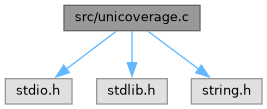unicoverage - Show the coverage of Unicode plane scripts for a GNU Unifont hex glyph file More...
#include <stdio.h>#include <stdlib.h>#include <string.h>
Go to the source code of this file.
Macros | |
| #define | MAXBUF 256 |
| Maximum input line length - 1. More... | |
Functions | |
| int | main (int argc, char *argv[]) |
| The main function. More... | |
| int | nextrange (FILE *coveragefp, unsigned *cstart, unsigned *cend, char *coverstring) |
| Get next Unicode range. More... | |
| void | print_subtotal (FILE *outfp, int print_n, int nglyphs, unsigned cstart, unsigned cend, char *coverstring) |
| Print the subtotal for one Unicode script range. More... | |
Detailed Description
unicoverage - Show the coverage of Unicode plane scripts for a GNU Unifont hex glyph file
- Copyright
- Copyright (C) 2008, 2013 Paul Hardy
Synopsis: unicoverage [-ifont_file.hex] [-ocoverage_file.txt]
This program requires the file "coverage.dat" to be present in the directory from which it is run.
Definition in file unicoverage.c.
Macro Definition Documentation
◆ MAXBUF
| #define MAXBUF 256 |
Maximum input line length - 1.
Definition at line 63 of file unicoverage.c.
Function Documentation
◆ main()
| int main | ( | int | argc, |
| char * | argv[] | ||
| ) |
The main function.
- Parameters
-
[in] argc The count of command line arguments. [in] argv Pointer to array of command line arguments.
- Returns
- This program exits with status 0.
Definition at line 74 of file unicoverage.c.

◆ nextrange()
| int nextrange | ( | FILE * | coveragefp, |
| unsigned * | cstart, | ||
| unsigned * | cend, | ||
| char * | coverstring | ||
| ) |
Get next Unicode range.
This function reads the next Unicode script range to count its glyph coverage.
- Parameters
-
[in] coveragefp File pointer to Unicode script range data file. [in] cstart Starting code point in current Unicode script range. [in] cend Ending code point in current Unicode script range. [out] coverstring String containing <cstart>-<cend> substring.
- Returns
- Length of the last string read, or 0 for end of file.
Definition at line 196 of file unicoverage.c.

◆ print_subtotal()
| void print_subtotal | ( | FILE * | outfp, |
| int | print_n, | ||
| int | nglyphs, | ||
| unsigned | cstart, | ||
| unsigned | cend, | ||
| char * | coverstring | ||
| ) |
Print the subtotal for one Unicode script range.
- Parameters
-
[in] outfp Pointer to output file. [in] print_n 1 = print number of glyphs, 0 = print percentage. [in] nglyphs Number of glyphs in current range. [in] cstart Starting code point for current range. [in] cend Ending code point for current range. [in] coverstring Character string of "<cstart>-<cend>".
Definition at line 237 of file unicoverage.c.
